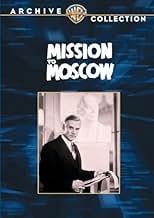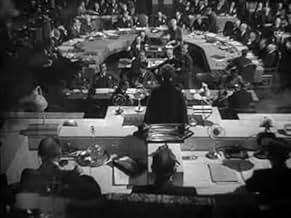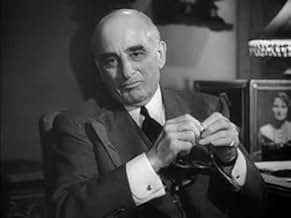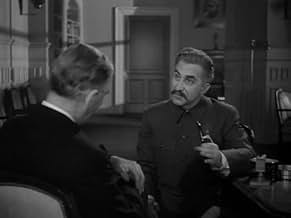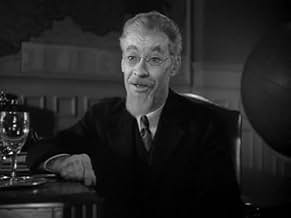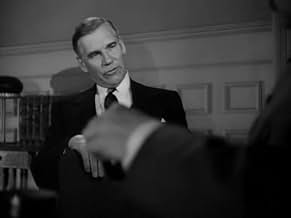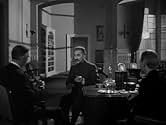IMDb RATING
5.4/10
1.1K
YOUR RATING
Ambassador Joseph Davies is sent by FDR to Russia to learn about the Soviet system and returns to America as an advocate of Stalinism.Ambassador Joseph Davies is sent by FDR to Russia to learn about the Soviet system and returns to America as an advocate of Stalinism.Ambassador Joseph Davies is sent by FDR to Russia to learn about the Soviet system and returns to America as an advocate of Stalinism.
- Nominated for 1 Oscar
- 2 wins & 1 nomination total
- Director
- Writers
- All cast & crew
- Production, box office & more at IMDbPro
Featured reviews
I can understand the need for pro-allied propaganda when the outcome of the war was still uncertain, but this was pathetic. It's no surprise that Howard Koch was the screenwriter for this rather sorry effort to promote Soviet propaganda, or that he was later cited by the HUAC. Propaganda can be fun - try North Star or Days of Glory. This movie is not an effort to raise morale or promote a cohesive war effort. It's purpose appears to try to justify any and all the barbaric atrocities committed during the Stalin regime. Example: The show trials were interspersed with remarks by allied journalists approving of the same judicial perversion for which we condemned Germany at Nueremburg. We agreed with the Soviet position that Trotsky was responsible for undermining the good works of the Soviet. We blame ourselves for the Russo-German alliance. The fact that Russia absorbed half of Poland in payment isn't discussed. This movie actually claims it was strategic move to buy time. Davies (Walter Huston) spends the entire movie trying to convince us that the Soviet Union performed a miracle, 5 yrs at a time. Big business is portrayed as greedy capitalists anxious to do business with Germany and Japan in pursuit of the Almighty buck. Russia invaded Finland as an act of self defense etc, etc. The examples are too numerous to mention.
Michael Curtiz' direction, as usual, is exciting and flawless. It is this movies' only saving grace. The early scene when Davies arrives at the Hamburg train station was precious. There are Swastikas everywhere. In typical Curtiz style, shadow troops marched passed the camera. Mein Kampf was for sale everywhere. Pathetic deportees are on the platform - number tags on their chest - waiting for transport to the camps. Hitler Youth marching like toy soldiers. If you can put the politics aside (I couldn't) you can really enjoy the visuals.
But beware, there was a message to this madness.
Michael Curtiz' direction, as usual, is exciting and flawless. It is this movies' only saving grace. The early scene when Davies arrives at the Hamburg train station was precious. There are Swastikas everywhere. In typical Curtiz style, shadow troops marched passed the camera. Mein Kampf was for sale everywhere. Pathetic deportees are on the platform - number tags on their chest - waiting for transport to the camps. Hitler Youth marching like toy soldiers. If you can put the politics aside (I couldn't) you can really enjoy the visuals.
But beware, there was a message to this madness.
Is that why he put forward this saccharine view of the Soviet Union? It was done sincerely and naively, was it?
I remember this -- the 1943 film version of Ambassador Davies' book -- as quite dull, in spite of its obvious historical and political interest, from when I last saw it a number of years ago. In the notes I took down at the time, I have the film labelled as "disturbing propaganda" and cite two choice quotations:
"At least, one European nation with no aggressive intentions is ready for whatever comes", exclaims Ambassador Davies (as portrayed by Walter Huston).
According to a Soviet minister, "The army is strengthened by the purge of its traitors."
(Stalin almost succeeded in strengthening his army right out of existence.)
Amazon lists a couple of scholarly titles specific to the Ambassador Davies controversy. Perhaps this film will whet your appetite for a little more background.
I remember this -- the 1943 film version of Ambassador Davies' book -- as quite dull, in spite of its obvious historical and political interest, from when I last saw it a number of years ago. In the notes I took down at the time, I have the film labelled as "disturbing propaganda" and cite two choice quotations:
"At least, one European nation with no aggressive intentions is ready for whatever comes", exclaims Ambassador Davies (as portrayed by Walter Huston).
According to a Soviet minister, "The army is strengthened by the purge of its traitors."
(Stalin almost succeeded in strengthening his army right out of existence.)
Amazon lists a couple of scholarly titles specific to the Ambassador Davies controversy. Perhaps this film will whet your appetite for a little more background.
One of the most controversial films ever made, Mission To Moscow was not good for anyone's career who got involved with the making. Like Song Of Russia made over at MGM, Mission To Moscow was a film made specifically to improve Soviet-American relations in facing the common enemy they had.
The Soviet Union no matter how much the American Communist Party trumpeted their virtues, still had a real image problem in a lot of quarters due to the purges that Joseph Stalin conducted, due to the tremendous dislocation his five year plans created, due to the misery caused by the collectivization of agriculture and the systematic slaughter of Kulaks. Kulaks roughly translated could be anyone who owned a large estate to someone who might own a slightly bigger piece of land and maybe some farm animals. Stalin slaughtered thousands of them to force collectivization.
Our first ambassador to the Soviet Union was William C. Bullitt who was sent there in 1933. The Republican post World War I presidents did not diplomatically recognize the Soviet Union, Franklin Roosevelt's first foreign policy initiative was to extend recognition. Bullitt was a guy at first enthused, but then got very disillusioned by what he saw. He and FDR had a falling out and he left Moscow in 1936.
Joseph E. Davies was an industrialist and large Democratic contributor who did go back with FDR to the Wilson administration. He was appointed US Ambassador and after that became a cheerleader for the Soviets. As is shown in the film, Davies just blindly accepted every piece of propaganda handed to him. Films made in 1943 were not going to cast a critical light on the dark underside of Communist Russia.
Walter Huston dusts off his Sam Dodsworth persona to play Ambassador Davies. Ann Harding plays his dutiful wife and Eleanor Parker their daughter. Vladimir Sokoloff is President Kalinin, Gene Lockhart plays Prime Minister Molotov and Oscar Homolka plays Foreign Minister Litvinov all well known personalities of the day. In the Soviet Union like other countries Davies would have been required to present his credentials to the president and Russia did have a figurehead president who was a great deal less than Mission To Moscow makes him out.
At that time Joseph Stalin was only the Secretary of the Presidium of the Communist Party, but as such wielded the real power. The People's Republic of China adopted a similar set up that never changed with Mao Tse-tung as Party head and holding the real power while Mao lived.
Stalin is played by actor Manart Kippen and is only seen once as Davies is prepared to leave the Russian embassy. He's so shy and retiring the portrayal is so absolutely ludicrous that it leaves me laughing. But Davies sitting through the purge trials and accepting without question all the testimonies and forced confessions is also ludicrous.
After his time was up as Ambassador, Davies wrote the book on which this film was based and did go on a speaking tour promoting Russo-American cooperation. He was doing this on behalf of his friend and president FDR, but Davies had also become a real true believer in the 'miracle' that was Soviet Russia.
When the Cold War started three films became the targets of the House Un American Activities Committee, they were ripe targets that the conservative members were grateful for. The three films were The North Star from 20th Century Fox, Song Of Russia from MGM, and Mission To Moscow. None got more criticism than this one. Screenwriter Howard Koch who had won an Oscar this same year for Casablanca, earned a place on the blacklist because of Mission To Moscow. Whatever Koch's personal political convictions were, in this case all he did was translate to the screen what was in Davies's book.
Davies was held up to ridicule and in some measure deserved a bit of it because of Mission To Moscow. Time and the end of the Cold War have given us a proper perspective of the Russian contribution towards defeating the Nazis. In fact it was the lion's share in Europe. Policy decisions were made on the basis of keeping the Russians in the war before the Americans and British and respective allies got on the European continent with forces to make it a two front war, first in Italy and then in France. There was a justifiable fear that Stalin would make a separate peace with Hitler just as he signed the non-aggression pact with him before World War II started in 1939.
Of course the reports that Davies wrote off about the brutality of the Soviet Union were also true. The reactionaries had a field day with him, he was never taken seriously again. For that reason Mission To Moscow has not worn well either as history or entertainment.
The Soviet Union no matter how much the American Communist Party trumpeted their virtues, still had a real image problem in a lot of quarters due to the purges that Joseph Stalin conducted, due to the tremendous dislocation his five year plans created, due to the misery caused by the collectivization of agriculture and the systematic slaughter of Kulaks. Kulaks roughly translated could be anyone who owned a large estate to someone who might own a slightly bigger piece of land and maybe some farm animals. Stalin slaughtered thousands of them to force collectivization.
Our first ambassador to the Soviet Union was William C. Bullitt who was sent there in 1933. The Republican post World War I presidents did not diplomatically recognize the Soviet Union, Franklin Roosevelt's first foreign policy initiative was to extend recognition. Bullitt was a guy at first enthused, but then got very disillusioned by what he saw. He and FDR had a falling out and he left Moscow in 1936.
Joseph E. Davies was an industrialist and large Democratic contributor who did go back with FDR to the Wilson administration. He was appointed US Ambassador and after that became a cheerleader for the Soviets. As is shown in the film, Davies just blindly accepted every piece of propaganda handed to him. Films made in 1943 were not going to cast a critical light on the dark underside of Communist Russia.
Walter Huston dusts off his Sam Dodsworth persona to play Ambassador Davies. Ann Harding plays his dutiful wife and Eleanor Parker their daughter. Vladimir Sokoloff is President Kalinin, Gene Lockhart plays Prime Minister Molotov and Oscar Homolka plays Foreign Minister Litvinov all well known personalities of the day. In the Soviet Union like other countries Davies would have been required to present his credentials to the president and Russia did have a figurehead president who was a great deal less than Mission To Moscow makes him out.
At that time Joseph Stalin was only the Secretary of the Presidium of the Communist Party, but as such wielded the real power. The People's Republic of China adopted a similar set up that never changed with Mao Tse-tung as Party head and holding the real power while Mao lived.
Stalin is played by actor Manart Kippen and is only seen once as Davies is prepared to leave the Russian embassy. He's so shy and retiring the portrayal is so absolutely ludicrous that it leaves me laughing. But Davies sitting through the purge trials and accepting without question all the testimonies and forced confessions is also ludicrous.
After his time was up as Ambassador, Davies wrote the book on which this film was based and did go on a speaking tour promoting Russo-American cooperation. He was doing this on behalf of his friend and president FDR, but Davies had also become a real true believer in the 'miracle' that was Soviet Russia.
When the Cold War started three films became the targets of the House Un American Activities Committee, they were ripe targets that the conservative members were grateful for. The three films were The North Star from 20th Century Fox, Song Of Russia from MGM, and Mission To Moscow. None got more criticism than this one. Screenwriter Howard Koch who had won an Oscar this same year for Casablanca, earned a place on the blacklist because of Mission To Moscow. Whatever Koch's personal political convictions were, in this case all he did was translate to the screen what was in Davies's book.
Davies was held up to ridicule and in some measure deserved a bit of it because of Mission To Moscow. Time and the end of the Cold War have given us a proper perspective of the Russian contribution towards defeating the Nazis. In fact it was the lion's share in Europe. Policy decisions were made on the basis of keeping the Russians in the war before the Americans and British and respective allies got on the European continent with forces to make it a two front war, first in Italy and then in France. There was a justifiable fear that Stalin would make a separate peace with Hitler just as he signed the non-aggression pact with him before World War II started in 1939.
Of course the reports that Davies wrote off about the brutality of the Soviet Union were also true. The reactionaries had a field day with him, he was never taken seriously again. For that reason Mission To Moscow has not worn well either as history or entertainment.
Among the comments here I don't see much recognition of the fact that this propaganda film was released at the height of World War II, when the battle against Nazis was focused on Stalingrad, which arguably was the crucial battle of the war in Europe.
The context of this film cannot be ignored or minimized. Propaganda films are morale films, and the omissions and distortions which have been cited in Mission to Moscow are beside the point. Of course Stalin was a monster before, during and after World War II. Of course Joseph E. Davies was a naif, and a pompous one at that. Perhaps that's why he only lasted a year as ambassador.
On one hand, there is an absolutely ludicrous review here, praising Mission to Moscow as dispelling the terrible calumnies against the great Soviet achievements. On the other hand, there are those on the opposite side who, though far more accurate about Stalin and about how this film whitewashes his atrocities, seem so rabid in their responses, they fail to understand, or conveniently ignore, that propaganda films as documentaries are more or less bull, and that it's stupid to criticize a propaganda film because it's a propaganda film.
What is interesting about Mission to Moscow is not what it is trying to say or do, which requires little insight to divine, but how well it does it. This is a Hollywood "A" film enlisted in the service of propaganda. Top cast, direction and production values should have made for a very strong message to 1943 American audiences, whom the government wanted to think of the war against Germany as "We're all in this together."
As to the outrage of Stalin's show trials, I think that the sinister, menacing demeanor of one of the great Hollywood heavies Victor Francen as prosecutor Vyshinsky, versus the rather meek, contemplative demeanor of the defendants, suggests that the film knows what's going on, even if Davies doesn't.
Yes, the relentless pro-Soviet propaganda is a bit hard to take for those who sit smugly in the light of hindsight. But if you look at Mission to Moscow as document rather than documentary, you will gain an insight into the kind of public mindset called for by our government at a crucial moment in our history.
The context of this film cannot be ignored or minimized. Propaganda films are morale films, and the omissions and distortions which have been cited in Mission to Moscow are beside the point. Of course Stalin was a monster before, during and after World War II. Of course Joseph E. Davies was a naif, and a pompous one at that. Perhaps that's why he only lasted a year as ambassador.
On one hand, there is an absolutely ludicrous review here, praising Mission to Moscow as dispelling the terrible calumnies against the great Soviet achievements. On the other hand, there are those on the opposite side who, though far more accurate about Stalin and about how this film whitewashes his atrocities, seem so rabid in their responses, they fail to understand, or conveniently ignore, that propaganda films as documentaries are more or less bull, and that it's stupid to criticize a propaganda film because it's a propaganda film.
What is interesting about Mission to Moscow is not what it is trying to say or do, which requires little insight to divine, but how well it does it. This is a Hollywood "A" film enlisted in the service of propaganda. Top cast, direction and production values should have made for a very strong message to 1943 American audiences, whom the government wanted to think of the war against Germany as "We're all in this together."
As to the outrage of Stalin's show trials, I think that the sinister, menacing demeanor of one of the great Hollywood heavies Victor Francen as prosecutor Vyshinsky, versus the rather meek, contemplative demeanor of the defendants, suggests that the film knows what's going on, even if Davies doesn't.
Yes, the relentless pro-Soviet propaganda is a bit hard to take for those who sit smugly in the light of hindsight. But if you look at Mission to Moscow as document rather than documentary, you will gain an insight into the kind of public mindset called for by our government at a crucial moment in our history.
An odd little movie. "Mission to Moscow" was brought to my attention by a BBC documentary on Stalin in the war years "WWI Behind Closed Doors". It describes the intense diplomatic efforts made by the allies during WWII to bring the Soviet Union into the war against Germany. Leaders in the West were willing to cast a blind eye to Soviet brutality and repression, including the massacre of Polish military officers at Katyn and the establishment of puppet governments in the territories they controlled, in order to keep them on the side of the West. This effort involved swaying public opinion in Western countries, and Joseph Davies' "Mission to Moscow" was cited as an example of this effort. There is an excellent article on Davies in Wikipedia, which describes how keen he was to see only the positive in the Soviet Union. Ironies abound in this film. Molotov appears as a kindly old professorial gent, Stalin is a hopeful visionary yearning for world peace. The glimpses of daily life in the Soviet Union include ice skating parties with piles of food, high fashion for the ladies, English-speaking railroad workers with nothing but love for their country, and American expatriates expressing admiration for the inventiveness of the Russian hosts they are there to help. In fact, while Davies was ambassador, a large number of American expats were being imprisoned by Stalin as counter-revolutionaries, despite having voluntarily emigrated to the Soviet Union to contribute to building a new society. Many petitioned the US Embassy to have their passports restored, and Davies refused to intervene. At one point, the US embassy staff in Moscow threatened to resign en masse. When Stalin consolidated power with the purges of his former associates in 1936 ~ 1938, Davies attended several of the show trials, and in "Mission to Moscow" he is shown nodding knowingly when Bukharin and the other defendants "confess" to their anti-Soviet activities and conspiratorial association with the now arch-enemy Trotsky. In the movie, Davies repeatedly insists that his mission is to see the **real** Soviet Union first-hand, yet in his visits were said to have been highly scripted and organized by the Soviet authorities. In retrospect, Davies comes off as a naïve fool, but seen in the larger context, perhaps someone a little more competent would not have been able to supplied the West with the kind of pro-Soviet view Davies could supply.
But let's put history aside for a moment. This is just a bad film. It is stilted, over-scripted, and whatever points it is trying to make are spoon-fed to the audience. Davies had control over the final script, and his scenes come off as highly self-serving: Davies warning of the dangers of war over the objections of more experienced statesmen, Davies being congratulated at every turn by one world leader after the next for his insight into the coming war in Europe. You know pretty much at the beginning of each scene what is going to unfold – a vacation with the family to get away from world affairs ends with a phone call from the White House, a meeting with senators expressing doubt about the strength of Germany will end with Davies convincing them with facts to the contrary. And Walter Huston is just overworked here – he has to carry virtually every scene, because really, Mission to Moscow is mostly about Davies himself.
A just plain awful movie and yet fascinating to watch, especially for a glimpse into this brief period of time when the US actually tried to like Stalin, and fascinating also for the fantasy views of Soviet life in the late 1930s. And particularly worthwhile if you also take the time to research the persons and events portrayed in the movie and juxtapose these against the events portrayed in Mission to Moscow. It is a very educational experience.
At the time I saw this movie, it was not available on DVD, but could be downloaded from the Warner Brothers movie archive.
But let's put history aside for a moment. This is just a bad film. It is stilted, over-scripted, and whatever points it is trying to make are spoon-fed to the audience. Davies had control over the final script, and his scenes come off as highly self-serving: Davies warning of the dangers of war over the objections of more experienced statesmen, Davies being congratulated at every turn by one world leader after the next for his insight into the coming war in Europe. You know pretty much at the beginning of each scene what is going to unfold – a vacation with the family to get away from world affairs ends with a phone call from the White House, a meeting with senators expressing doubt about the strength of Germany will end with Davies convincing them with facts to the contrary. And Walter Huston is just overworked here – he has to carry virtually every scene, because really, Mission to Moscow is mostly about Davies himself.
A just plain awful movie and yet fascinating to watch, especially for a glimpse into this brief period of time when the US actually tried to like Stalin, and fascinating also for the fantasy views of Soviet life in the late 1930s. And particularly worthwhile if you also take the time to research the persons and events portrayed in the movie and juxtapose these against the events portrayed in Mission to Moscow. It is a very educational experience.
At the time I saw this movie, it was not available on DVD, but could be downloaded from the Warner Brothers movie archive.
Did you know
- TriviaThis film was often mentioned during the 1947 House Un-American Activities Committee (HUAC) in its investigation of alleged Communist infiltration of the motion picture industry and was chiefly responsible for the blacklisting of screenwriter Howard Koch. Warner Bros. studio head Jack L. Warner defended the picture as being "made when our country was fighting for its existence, with Russia as one of our allies . . . The picture was made only to help a desperate war effort and not for posterity."
- GoofsAside from the issue of the fairness of the Moscow purge trials, or the truthfulness of the alleged confessions of the accused, the people shown standing trial together in the film in fact did not all stand trial at the same time. There were two such major show trials, one in 1937, the second in 1938, and the real life characters depicted in the film as being tried simultaneously were actually tried in separate groups at one of the two trials.
- Quotes
Ambassador Joseph E. Davies: Mr. Stalin, I believe history will record you as a great builder for the benefit of mankind.
- Crazy creditsOpens with a card reading: We have the honor to present the former Ambassador from the United States to the Soviet Union, the Honorable Joseph E. Davies, who will address you prior to the showing of the film made from his important book, "Mission to Moscow". In the picture itself, Mr. Walter Huston portrays Mr. Davies during those vital years encompassed in his now significant report to this nation. And now, Mr. Davies: [Mr. Davies gives a presentation on the actual events leading up to these events, and to this film.]
- ConnectionsFeatured in Hollywood on Trial (1976)
- SoundtracksAmerica
(uncredited)
aka "My Country 'tis of Thee"
Music from "God Save the King"
Traditional
[In the score when Woodrow Wilson's bust is shown]
- How long is Mission to Moscow?Powered by Alexa
Details
- Release date
- Country of origin
- Languages
- Also known as
- Mission to Moscow
- Filming locations
- Lake Arrowhead, San Bernardino National Forest, California, USA(Lake that Joe and family set off in a dingy named after his wife Marjorie)
- Production company
- See more company credits at IMDbPro
Box office
- Budget
- $1,516,000 (estimated)
- Runtime2 hours 4 minutes
- Color
- Aspect ratio
- 1.37 : 1
Contribute to this page
Suggest an edit or add missing content


